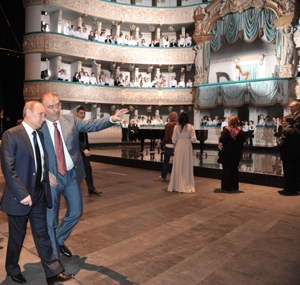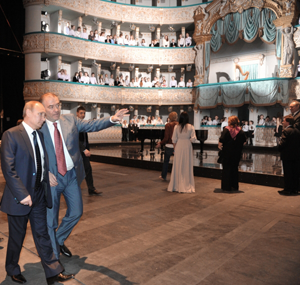
Photo by Alexei Nikolskyi
On Oct. 7, in the Kammermusiksaal of the Berlin Philharmonie, a protest/benefit concert will take place that should really sell out a stadium, not a 1,180-seat chamber music hall.
The lineup is stellar: pianists Martha Argerich, Khatia Buniatishvili, and Daniel Barenboim; flautist Emmanuel Pahud, trumpeter Sergei Nakariakov, composer Giya Kancheli, cellist Nicolas Altstaedt, bayan player Elsbeth Moser, the Ukrainian children’s choir Shchedryk, conductor Roman Kofman and Gidon Kremer’s Kremerata Baltica — with more to come.
Before the concert, Amnesty International and several other organizations are participating in a symposium called “We Will Not be Intimidated: Russia’s Civil Society Under Pressure.” Kremer told Die Welt:
“I’m very concerned that more and more freedoms that we take for granted — such as the freedom of speech and artistic freedom — are being curtailed in Russia. It’s like it was in the Soviet Union, but of course with different methods and not as draconian as in Stalin’s time. Jail sentences such as the two years for Pussy Riot are unjust and disproportionate.”
Kremer commented, without naming names, on such staunch supporters of Putin as soprano Anna Netrebko, conductor Valery Gergiev, and violist Yuri Bashmet:
“I couldn’t and wouldn’t do what such people do. They call it patriotism. But for me, it’s more like opportunism and its only aim is to look after their own interests. As an artist, it’s not only my right, but also my duty to show my true colours and draw attention to such problems.”
He said he had great respect for such late artists as Pablo Casals and Mstislav Rostropovich, and violinist Yehudi Menuhin who were not afraid to “take a stance and fight for freedom.”
Kremer himself was born in Soviet-occupied Latvia, in 1947. His father was Jewish and had survived the Holocaust. From 1965, Kremer studied with David Oistrakh at the Moscow Conservatory. In 1967, he won third prize at the Queen Elisabeth Music Competition in Brussels; in 1969, second prize at the Montreal International Violin Competition, followed by first prize at the Paganini Competition in Genoa and first prize in 1970 at the International Tchaikovsky Competition in Moscow.

